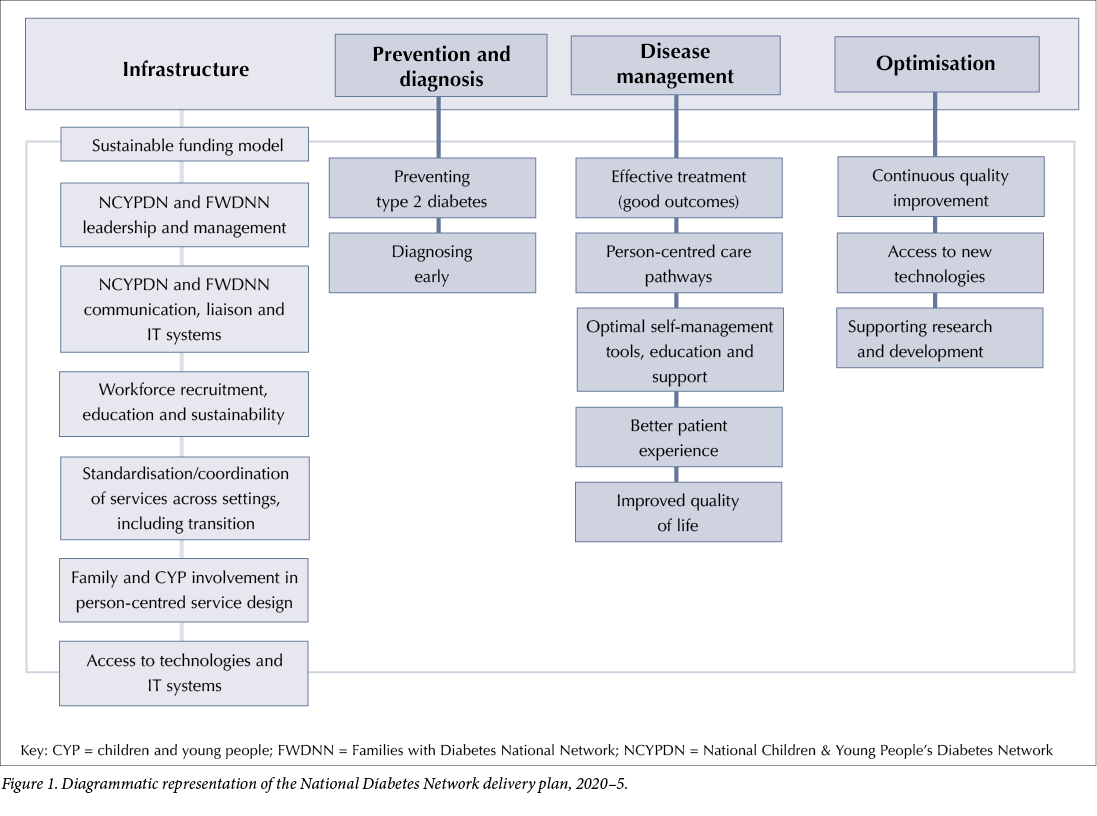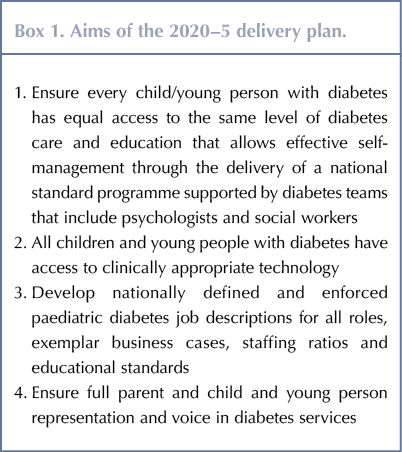Infrastructure improvement is the immediate priority if diabetes services for children and young people (CYP) are to continue to improve over the next 5 years, according to the new National Children & Young People’s Diabetes Network delivery plan. This infrastructure requires a strong national network with a focus on providing standardised, high-quality, person-centred care – the cornerstone of the plan. It will cover prevention and diagnosis, disease management and optimisation, see Figure 1.
To deliver the proposed service, healthcare professionals will need to work in a multidisciplinary and adaptable manner, using an array of tools and technologies to deliver care and support to CYP and their families. This will require ongoing practitioner education and the prompt uptake and rollout of innovations locally and nationally. Building connections with a wide range of stakeholders, including other parts of the health service, social care, schools, pharmacies and supportive digital environments such as DigiBete, will improve the delivery of comprehensive care. Close liaison with CYP and their families to ensure services meet local, national and regional requirements will be essential.
The plan, which spans 2020 to 2025, is focused on improving the quality of service planning, commissioning, delivery and regulation to improve outcomes. Its aims are given in Box 1. The delivery plan continues the Network’s mission to provide services designed around the needs of CYP with diabetes and their families, while using resources effectively and sustainably.
Demonstrating improvement and value
It is increasingly important that NHS services are able to demonstrate clinical- and cost-effectiveness, particularly in paediatric diabetes. With Best Practice Tariff payments not increasing since 2012 – equating to a reduction in real terms of about 30% – and an increasing number of trusts commissioning paediatric services – resulting in the risk that diabetes funding will be diverted to general paediatrics – evidence will be key to gaining support and securing ongoing investment. The annual National Paediatric Diabetes Audit, spotlight and local audits will play an important role in benchmarking and tracking paediatric diabetes service improvements over time, while robust analysis of the data will identify and provide understanding of performance gaps, driving quality improvement initiatives and informing strategy going forward. Information gathered by the CYP Diabetes Quality Programme will supplement this information.
Progress to date
The 2013–18 delivery plan, which focused on innovation, evaluation and life-long learning, improved Network members’ understanding of what it takes to consistently and sustainably improve outcomes within the NHS. Work carried out has improved understanding of the aims CYP and their families have with regards to diabetes management, while clinician experience and data collected locally and nationally are being used to drive service improvements and share good practice.
Since its inception in 2010, there have been a number of key developments in diabetes services for CYP in England and Wales. The National Paediatric Diabetes Audit, National Diabetes Quality Programme and Best Practice Tariff in England now work in tandem to gather data, benchmark services, enhance multidisciplinary care, reduce unwarranted variations and award payments to teams delivering diabetes care of the specified quality. The NHS Long-Term Plan is committed to redesigning services for CYP and identified diabetes as a long-term condition it intends to support.
Fiona Campbell, National Network Clinical Lead, said “Over the past 10 years, the clinical outcomes measured by the National Diabetes Audit have improved. We want to continue on this quality improvement journey and feel strongly that this can be done by the Network continuing to foster a culture where patients and families, and the communities in which they live, work collaboratively with healthcare professionals and other providers in mutually beneficial partnerships to improve care.”
For the full National Children & Young People’s Diabetes Network delivery plan, click here







NHSEI National Clinical Lead for Diabetes in Children and Young People, Fulya Mehta, outlines the areas of focus for improving paediatric diabetes care.
16 Nov 2022